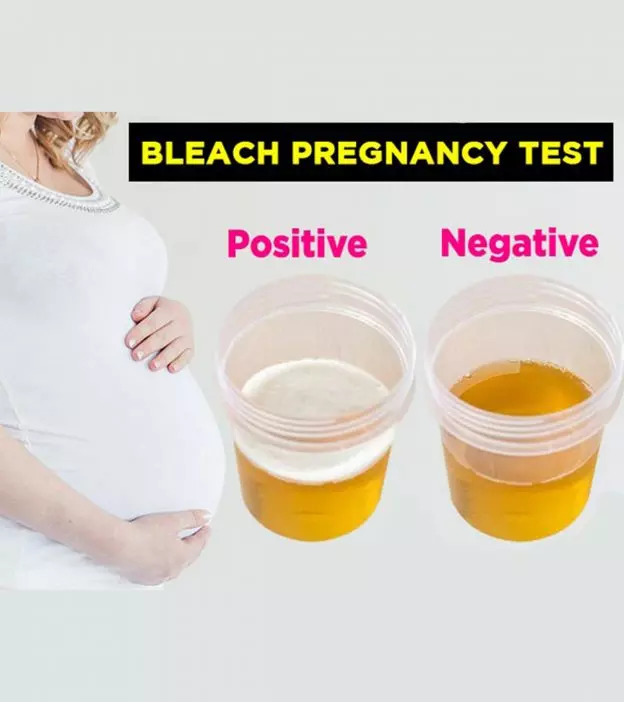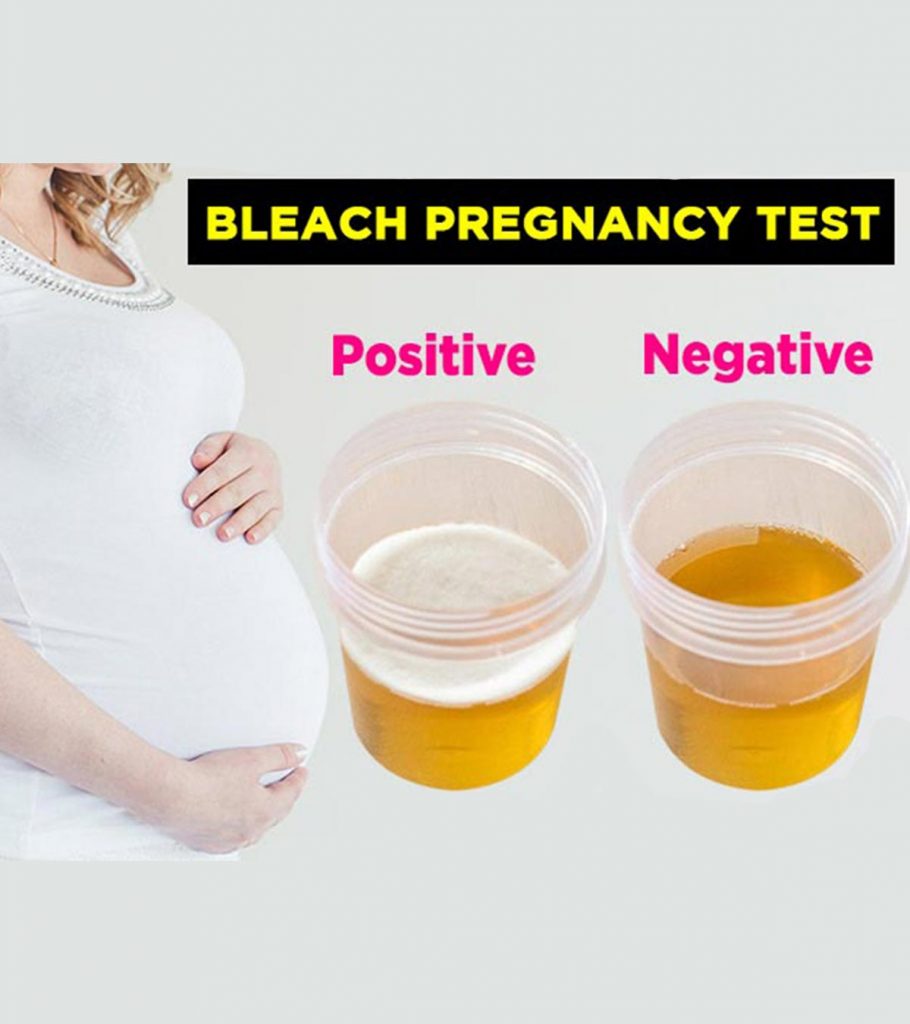[ad_1]

A delayed or missed period may make one wonder if they are pregnant. Some couples may consider having a home pregnancy test, such as a bleach home pregnancy test. You may consider such tests either as a preliminary test or because you have no access to home pregnancy test kits immediately. But is the test accurate?
Read this post to learn about the bleach pregnancy test, its accuracy, procedure, and the necessary precautions to take while performing it.
What Is A Bleach Pregnancy Test?
A bleach test is a traditional, convenient, and inexpensive method to determine whether or not you are pregnant. If you are shy about buying a pregnancy kit from the pharmacy or you do not wish to visit a clinic, this test can be a handy option for you to try at home.
Is The Bleach Pregnancy Test Accurate?
There are no studies to support this method. It cannot be said that the bleach pregnancy test is 100% accurate. However, it might give you the right result if you try it around five to ten days after you missed a period when the hCG levels can be detected in the urine (1). In case your result is negative and you still haven’t got your periods, you can try the test again.
Read on to know the science behind this home-based pregnancy test.
How Does It Work?
Once the embryo is planted in the uterus, the placenta produces a hormone called hCG or human chorionic gonadotropin. This hormone is found in the urine of pregnant women. Hence, the presence of this hormone is considered to be a sign of pregnancy (2).
When hCG in the urine and bleach (sodium hypochlorite) are mixed, froth or bubbles are formed indicating that you are pregnant. If there is no reaction when the urine comes into contact with bleach, it suggets the absence of hCG, which means you are not pregnant. The type or quality of bleach you use may also influence the results of this test.
Which Bleach To Use For This Test?
You can use the standard bleach that you use for cleaning or other purposes at home. Do not use industrial-grade bleach or colored and scented bleach as these may have certain chemicals that could tamper the results.
Safety precautions: Avoid using bleach with amonia, and avoid any direct contact of bleach with skin or eyes, as it can cause irritation and burning.
The Bleach Pregnancy Test Procedure
You would require:
- Household bleach with no amonia
- Two cups for the test, mark them as cup A and cup B
- A sample of mistream urine (fresh)
Follow this step-by-step approach to perform the test:
Step 1: Take a fresh urine sample in cup A. Fill 1/4th of the cup, ideally by urinating directly into the cup.
Step 2: Add bleach in cup B, about 1/4th of the cup. Make sure you are using a disposable spoon to add the bleach and not reusable cutlery used for eating, as bleach is is toxic and may remain on the spoon even after washing.
Step 3: Pour bleach from cup B into the cup that has urine. See that you are doing it slowly while giving time for the mixture to react
Step 4: Wait for a few minutes to observe the reaction.
Frothing urine could indicate a positive pregnancy result.
Interpreting Bleach Pregnancy Test Results
Positive bleach pregnancy test: If you find any fizz or froth in the reaction, it could be indicative of a positive result.
Negative bleach pregnancy test: If there is no reaction, it is negative and you are not pregnant.
Besides being simple to take, this test is also popular for other reasons. Find out what makes this test ideal for women.
Why Is The Bleach Pregnancy Test So Popular?
The bleach pregnancy test preferred by many because it is:
- Cost-effective: There is no doubt that the pregnancy test with bleach is affordable, considering that you are using the things that are readily available at home.
- Quick results: This is also one of the top reasons why many women perform a bleach test. You do not have to go anywhere or wait for hours to get the results. All you have to do is take the test, and your result will appear right then and there.
- Convenient: There are no hassles of buying a pregnancy kit or driving to the clinic. No pregnancy test can be more convenient than this.
However, a lot of you may be thinking about its safety.
Is Bleach Pregnancy Test A Safe Option?
Yes, provided you are doing it with caution. The bleach pregnancy test is a simple method to know whether you are pregnant or not. However, it is essential to be careful while performing the test as it might release some fumes.
What Precautions To Take During The Bleach Pregnancy Test?
Here are a few precautions you need to know:
- Do not drink too much water or other fluids before taking the test as the hCG levels in the urine can be diluted with excess fluids.
- It is easy to detect the hCG levels either in the early morning urine or in the urine which has been in the bladder for about 4 hours (1).
- Make sure you are performing the test as instructed only.
1. Can taking health supplements lead to a false result?
No, because the supplements that may have hCG are not legally available in the market. So there is no chance of any supplements interfering with the hCG levels in the urine, to give a false result (3).
2. Can the bleach pregnancy test give a false positive?
Yes, it might happen if you are taking any medications prescribed under fertility treatments. These medications contain hCG, which when mixed with urine may cause bubbles or fizz thus giving a false positive result (4).
The bleach pregnancy test is a simple and conveniently good option if you don’t want to go to the hospital or are too embarrassed to buy a pregnancy kit. However, the timing of the test must be precise enough to detect hCG in urine; otherwise, false-negative findings may ensue. Similarly, the type or quality of bleach you use in the test may impact the test’s results. Therefore, despite the test result, if you believe you’re showing indications of early pregnancy or missed periods after unprotected sex, you may consult a doctor to confirm.
Infographic: Unfavorable Consequences Of Bleach Test And Preventive Methods
Homemade tests could sound like exciting ways to confirm pregnancy, but experimenting with the chemicals may sometimes cause more harm than good. So, check out this infographic to learn the possible risks of a bleach pregnancy test and what you can do to avoid them.
Key Pointers
- A bleach pregnancy test is a simple and effective home-based method of determining whether or not you are pregnant.
- No-ammonia household bleach, two cups, and your urine sample are all you need for a bleach pregnancy test.
- But, the accuracy of a bleach pregnancy test is not reliable.
- Drinking too much fluid or water before taking the test can hamper results.
- If you’re undergoing fertility treatments, a bleach pregnancy test might result in a false positive.
References:


Annette is a Certified Lactation Consultant, midwife and infant massage instructor. She completed a B.Sc Hons Midwifery degree at Greenwich University, an infant massage instructor’s course in London, a Diploma in Nursing (General, Psychiatry, Community & Midwifery) in CT and then completed her Certified Lactation Consultant course at Wits University, SA (SACLC).
[ad_2]
Source link
